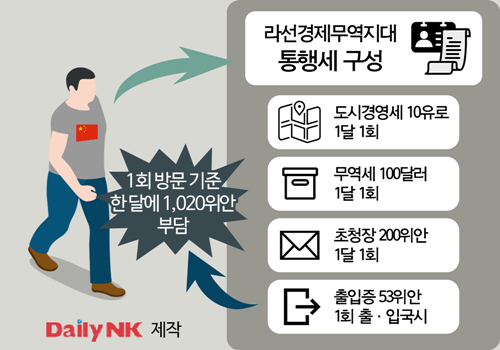Since early May, the North Korean authorities have begun collecting tolls from Chinese residents traversing the Sino-North Korean border for business in the Rason Economic and Trade Zone, Daily NK’s sources have learned.
The new fees are being collected at the Sonbong-Wonjong Customs office in Rason City, North Hamgyong Province, located opposite Quanhe Commercial District in Hunchun City, Jilin Province, China.
“The North Korean authorities are abruptly demanding new fees which did not exist before. For this reason, many of the Chinese merchants are reconsidering their trade plans with North Korea,” a source familiar with North Korean affairs in China told Daily NK on May 15.
Specifically, the authorities have adopted measures differentiating foreign currencies to be paid for each of the new toll categories. This appears to be part of wider efforts to secure sorely-needed foreign currency for the regime.
According to the source, Chinese citizens are required to pay four different types of tolls. Ten EUR is required for “city maintenance,” as well as a 100 USD “trade fee,” which is mandated for all Chinese citizens, even those who are not involved in trade. Thirdly, a 200 RMB “invitation fee” is needed. The aforementioned three categories require payments on a monthly basis.
Lastly, Chinese citizens have to pay for an entry card issued by the Rason Immigration Office. On arrival, the card must be submitted to a nearby North Korean bank with a 53 RMB fee paid. The payment is recorded on the card, and the person is finally permitted to stay in designated accommodation and to leave the country. This entry fee is required for every visit.
The four fee types combined approximate 1020 RMB, which is a significant amount for traders.
“If euros or dollars are unavailable, people can pay yuan instead. But this is also confusing due to the fluctuating exchange rate. The North Korean authorities seem to have resorted to the fee system to fulfill foreign currency quotas,” said an additional source with ties to North Korea in China.
He explained that the estimated losses for Chinese merchants who pass through Rason customs will be immense.
“Chinese merchants who have to frequently pass through customs may have to end their business with North Korea due to the heavy passenger taxes. The measures seem to have arisen amidst the fraught bilateral relations between China and North Korea,” he concluded.






















